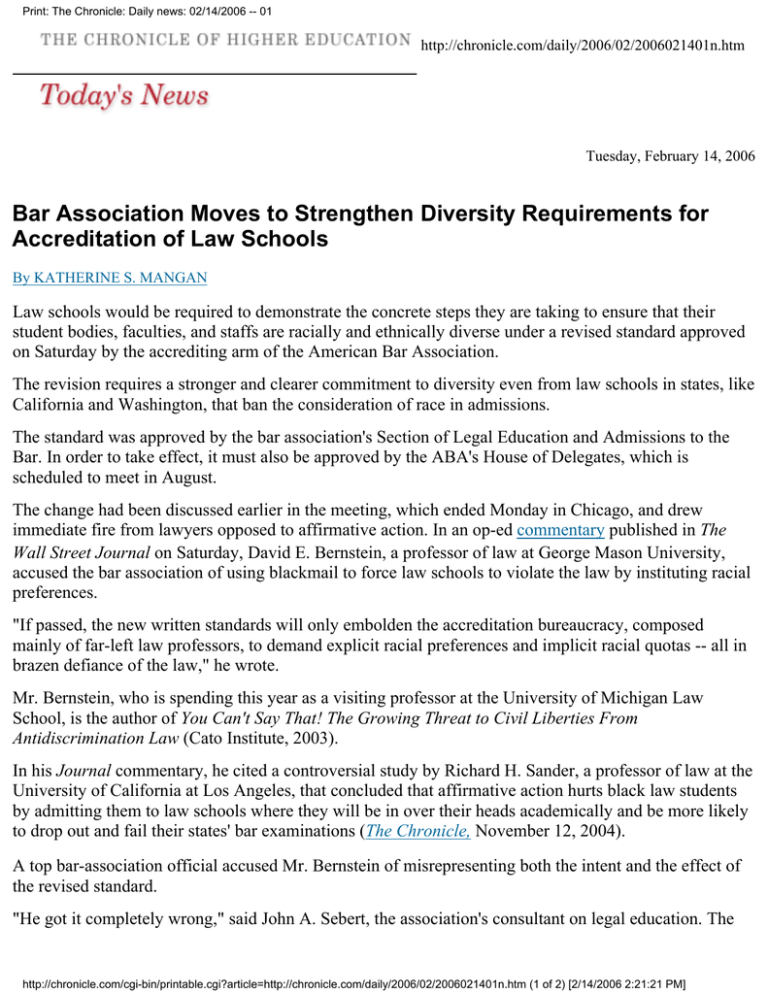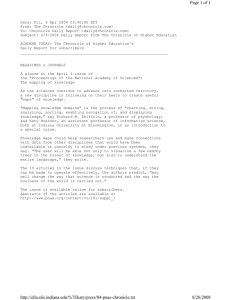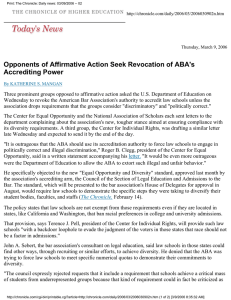Bar Association Moves to Strengthen Diversity Requirements for
advertisement

Print: The Chronicle: Daily news: 02/14/2006 -- 01 http://chronicle.com/daily/2006/02/2006021401n.htm Tuesday, February 14, 2006 Bar Association Moves to Strengthen Diversity Requirements for Accreditation of Law Schools By KATHERINE S. MANGAN Law schools would be required to demonstrate the concrete steps they are taking to ensure that their student bodies, faculties, and staffs are racially and ethnically diverse under a revised standard approved on Saturday by the accrediting arm of the American Bar Association. The revision requires a stronger and clearer commitment to diversity even from law schools in states, like California and Washington, that ban the consideration of race in admissions. The standard was approved by the bar association's Section of Legal Education and Admissions to the Bar. In order to take effect, it must also be approved by the ABA's House of Delegates, which is scheduled to meet in August. The change had been discussed earlier in the meeting, which ended Monday in Chicago, and drew immediate fire from lawyers opposed to affirmative action. In an op-ed commentary published in The Wall Street Journal on Saturday, David E. Bernstein, a professor of law at George Mason University, accused the bar association of using blackmail to force law schools to violate the law by instituting racial preferences. "If passed, the new written standards will only embolden the accreditation bureaucracy, composed mainly of far-left law professors, to demand explicit racial preferences and implicit racial quotas -- all in brazen defiance of the law," he wrote. Mr. Bernstein, who is spending this year as a visiting professor at the University of Michigan Law School, is the author of You Can't Say That! The Growing Threat to Civil Liberties From Antidiscrimination Law (Cato Institute, 2003). In his Journal commentary, he cited a controversial study by Richard H. Sander, a professor of law at the University of California at Los Angeles, that concluded that affirmative action hurts black law students by admitting them to law schools where they will be in over their heads academically and be more likely to drop out and fail their states' bar examinations (The Chronicle, November 12, 2004). A top bar-association official accused Mr. Bernstein of misrepresenting both the intent and the effect of the revised standard. "He got it completely wrong," said John A. Sebert, the association's consultant on legal education. The http://chronicle.com/cgi-bin/printable.cgi?article=http://chronicle.com/daily/2006/02/2006021401n.htm (1 of 2) [2/14/2006 2:21:21 PM] Print: The Chronicle: Daily news: 02/14/2006 -- 01 revised standard clarifies that law schools may consider race and ethnicity in admissions, Mr. Sebert said on Monday, but does not require them to take that approach. If they do not, however, they must demonstrate specific steps they are taking to achieve the goal of diversity, such as recruiting at historically black colleges, offering scholarships to minority or disadvantaged students, or holding summer programs to help potential applicants prepare for law school. Mr. Sebert said that the standard, which has not been revised in 15 years, needed to be updated in light of the U.S. Supreme Court's 2003 decision upholding the Michigan law school's use of race-conscious admissions (The Chronicle, July 4, 2003). The title of the revised policy, Standard 211, would be changed from "Equal Opportunity" to "Equal Opportunity and Diversity." It would apply to admitting students, appointing faculty members, and hiring other staffers. The policy says that law schools must demonstrate, "by concrete action, a commitment to providing full opportunities for the study of law and entry into the profession by members of underrepresented groups, particularly racial and ethnic minorities," and that the schools must commit "to having a student body that is diverse with respect to gender, race, and ethnicity." It also says: "Consistent with sound educational policy and the standards, a law school shall demonstrate by concrete action a commitment to having a faculty and staff that are diverse with respect to gender, race, and ethnicity." The revised standard also clarifies that "the mere fact that you may be in a state that has a statutorial provision prohibiting the consideration of race in the admissions process does not relieve you" of that obligation, Mr. Sebert said. Copyright © 2006 by The Chronicle of Higher Education Subscribe | About The Chronicle | Contact us | Terms of use | Privacy policy | Help http://chronicle.com/cgi-bin/printable.cgi?article=http://chronicle.com/daily/2006/02/2006021401n.htm (2 of 2) [2/14/2006 2:21:21 PM]


